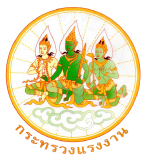The Ministry of Labour’s Spokesperson, Mr. Phumiphat Mueanchan, said that the Labour Minister, Mr. Phiphat Ratchakitprakarn, has the policy to produce labour graduates to represent the Ministry of Labour in the public sector in all 878 districts throughout Thailand within two years. Labour graduates act as a link with the local people, providing knowledge, information, and labour services, including promoting careers and employment in collaboration with agencies of the Ministry of Labour. In the past, a pilot project was to hire graduates who graduated with a bachelor’s degree to be volunteer labour graduates in the southern border provinces, namely Pattani, Yala, Narathiwat, and four districts of Songkhla Province (Chana, Nathawi, Thepha, Saba Yoi), totaling 380 people. This year, in 2024, there will be another 113 people nationwide. They will receive a monthly salary of 15,000 Baht and will also be insured under Section 33.
The Ministry of Labour’s Spokesperson said that the Labour Minister emphasized that labour graduates should study information and coordinate with local labour departments and other departments, including labour volunteers and the Five Tigers of Labour, to help explain helpful information to the public, such as the One Tambon One Freelance Group project, the Fund for Homeworkers, and the benefits of Section 40 insured persons.
“Labor graduates work at four levels: 1. They are locals, understand the language and context of the environment, and provide information to the public. 2. They are coordinators who provide services to the community, such as setting up career groups, providing career guidance, providing knowledge about going abroad, coordinating job searches, and helping take care of the elderly and disabled. 3. They are one-stop service providers according to the needs of the public, organizing community forums, analyzing problems, and requesting support from the government. 4. They are operators according to the plans of the Ministry of Labour at the local level, following up and reporting results to the Ministry. The production of labour graduates in the southern border provinces helps to support employment promotion, as well as solve the problems of youths dropping out of the education and employment systems, human trafficking, and developing the potential of independent labour groups, helping to create sustainable peace in the area,” said Mr. Phumiphat.
——————————
Division of Public Relations









